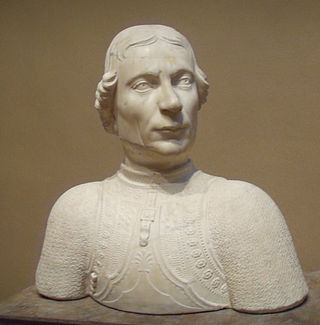
The House of Sforza was a ruling family of Renaissance Italy, based in Milan. Sforza rule began with the family's acquisition of the Duchy of Milan following the extinction of the Visconti family in the mid-15th century and ended with the death of the last member of the family's main branch, Francesco II Sforza, in 1535.

Condottieri were Italian military leaders during the Middle Ages and the Early Modern Period. The definition originally applied only to commanders of mercenary companies, condottiero in medieval Italian meaning 'contractor' and condotta being the contract by which the condottieri put themselves in the service of a city or lord. The term, however, came to refer to all the famed Italian military leaders of the Renaissance and Reformation era. Notable condottieri include Prospero Colonna, Giovanni dalle Bande Nere, Cesare Borgia, the Marquis of Pescara, Andrea Doria, and the Duke of Parma. They served Popes and other European monarchs and states during the Italian Wars and the European Wars of Religion.

The Visconti of Milan are a noble Italian family. They rose to power in Milan during the Middle Ages where they ruled from 1277 to 1447, initially as Lords then as Dukes, and several collateral branches still exist. The effective founder of the Visconti Lordship of Milan was the Archbishop Ottone, who wrested control of the city from the rival Della Torre family in 1277.

Bernabò or Barnabò Visconti was an Italian soldier and statesman who was Lord of Milan. Along with his brothers Matteo and Galeazzo II, he inherited the lordship of Milan from his uncle Giovanni. Later in 1355, he and Galeazzo II were rumoured to have murdered their brother Matteo since he endangered the regime. When Galeazzo II died, he shared Milan's lordship with his nephew Gian Galeazzo. Bernabò was a ruthless despot toward his subjects and did not hesitate to face emperors and popes, including Pope Urban V. The conflict with the Church caused him several excommunications. On 6 May 1385, his nephew Gian Galeazzo deposed him. Imprisoned in his castle, Trezzo sull'Adda, he died a few months later, presumably from poisoning.

Girolamo Riario was Lord of Imola and Forlì. He served as Captain General of the Church under his uncle Pope Sixtus IV. He was one of the organisers of the failed 1478 Pazzi conspiracy against the Medici family, the rulers of Florence, and was assassinated 10 years later by members of the Forlivese Orsi family.
Astorre Manfredi was an Italian condottiero. He was the son of Giovanni Manfredi, who had been lord of Faenza and other castles in the area before the Papal reconquest. Astorre lived for a while in Pistoia after his father had lost his last possession in Romagna; three years after the latter's death, in 1375, he managed to recover Granarolo.
Pandolfo III Malatesta was an Italian condottiero and lord of Fano, a member of the famous House of Malatesta. He was the father of the infamous Sigismondo Pandolfo Malatesta and Blessed Roberto Malatesta.
Guidantonio Manfredi was lord of Faenza and Imola in the early 15th century. He was also a condottiero.

Astorre II Manfredi was lord of Imola from 1439 and of Faenza from 1443.
Taddeo Manfredi was Lord of Imola from 1448 until 1473. As a condottiere, he was commander in the Florentine and Neapolitan (1448–1452) armies.

Pino III Ordelaffi was an Italian condottiero and lord of Forlì. He was a member of the Ordelaffi family.
Giovanni Manfredi (1324–1373) was lord of Faenza from 1341 until 13 September 1356, as well as of numerous other minor fiefs in Romagna.
Manfredi is a surname of Italian origin. The name may refer to:
The bailo and captain of Negroponte was the representative of the Republic of Venice stationed at Chalcis (Negroponte) on the island of Euboea. The bailo played an important role as the mediator between, and de facto overlord of, the triarchs of Euboea, who had their common residence in Negroponte. The triarchies were created by the division of the island between three rulers (triarchs) after its conquest following the Fourth Crusade (1204).








